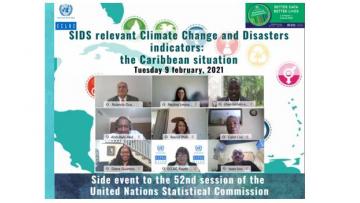Compared to other regions of the world, Latin America and the Caribbean has historically made a minor contribution to climate change. Nonetheless, the region is acutely vulnerable to its negative consequences, particularly the small island developing States (SIDS) of the Caribbean that have been continuously impacted by hazardous events, such as tropical storms, floods or landslides.
So far, global focus on measuring GHG emissions has not provided much support to better measure climate change occurrences, impacts (including damages and losses), and adaptation indicators, which remain the most relevant issues for the Caribbean. The “Caribbean relevant climate change and disasters indicators for evidence-based sustainable development policies” project is focused on disaster statistics and incorporates Covid-19-related data and statistics as a natural component. The slow paces of development of new statistical methodologies, and the challenges with timeliness and quality of data among Caribbean countries, hamper the production and use of relevant indicators in informing policy decisions and actions that are aimed at addressing climate change and disaster vulnerability and building resilience. Institutionalizing sound evidence-based sustainable development policies in the Caribbean requires quality, timely, and accessible climate change and disasters indicators that are harmonized and comparable across countries.
As embodied in the “Caribbean First” strategy of the Economic Commission for Latin America and the Caribbean (ECLAC) and articulated by its Executive Secretary on many occasions, the Caribbean subregion is a priority in ECLAC’s programme of work. Given the statistical capacity challenges of most Caribbean countries, ECLAC (Division of Statistics and Caribbean Subregional Headquarters) is launching this new project (2021-2023) with a focus on supporting capacity building of the national statistical systems of non-Spanish-speaking Caribbean countries to institutionalize climate change and disaster-related data collection and indicators production. Building on the current work already undertaken by important stakeholders of the region, such as the CARICOM and the United Nations Statistics Division, the project will also aim at enhancing the capacity of policy makers to use these indicators for more effective climate change and disaster risk reduction actions, thereby contributing to the coherent implementation and monitoring of the Sustainable Development Goals, the Paris Agreement, the Sendai Framework for Disaster Risk Reduction, the SIDS Accelerated Modalities Of Action (SAMOA) Pathway and other international agreements.
Objectives of the event
- To further the understanding of the opportunities and challenges related to climate change and disasters indicators production in the Caribbean
- To showcase the latest available evidence on measuring climate change (drivers, occurrence, impacts, vulnerability, mitigation and adaptation) and disasters in the Caribbean
- To explore the links between statistical production and policymaking related to climate change adaptation and resilience
- To discuss innovations and ways to improve climate change and disaster statistics and indicators production in the SIDS context
Target audience
The side-event targets SIDS and especially Caribbean member States. Key national stakeholders include representatives from National Statistical Offices, Disaster Risk Reduction/Emergency authorities and the Environment and Climate Change Ministries. Additionally, other stakeholders such as representatives of sectoral authorities and Ministries are welcome to join (i.e. health, water, forest, fisheries/aquaculture, coastal/seas, tourism, agriculture, meteorology authorities, as well as universities, research centers and other stakeholders related to the production and use of climate change and disaster indicators and their underlying statistics).
--------------------------------------------------------------------------------------------------------------------------------------------------------------------------
The webinar will take place on Tuesday February 9, 2021, from 11:00 to 12:30 (NY time) and 13:00 - 14:30 (Santiago, Chile time) through the Cisco-WEBEX platform
Registration and Webex connection details
The event is open and the Webex connection details will be sent after the participants register here: https://forms.gle/xfxnYpFjUDdqhNsq7
Focal point: Pauline Leonard (Pauline.leonard@cepal.org)
---------------------------------------------------------------------------------------------------------------------------------------------------------------------------
Main outcomes from the event:
- Strong partners’ commitment: development sub-regional partners and countries showed a strong commitment to participate in the project and contribute to the capacity-building efforts to develop and use climate change and disaster statistics and indicators.
- Enabling dialogue space: the side event encouraged dialogue between producers and users of data from different Caribbean SIDS countries, and development partners on the challenges of producing and using climate change and disaster indicators, the emerging practices and opportunities to synergize efforts.
---------------------------------------------------------------------------------------------------------------------------------------------------------------------------
Panelists
- Ms. Diane Quarless, Director of the ECLAC subregional headquarters for the Caribbean
- Mr. Rolando Ocampo, Director, Division of Statistics of ECLAC
- Ms. Carol Coy, Director General of the Statistical Institute (STATIN), Jamaica
- Mr. Iwan Sno, Director of the General Bureau of Statistics, Suriname
- Mr. Jason Williams, Data manager of the Department of the Environment of Antigua and Barbuda
- Dr. Philomen Harrison, Programme Director for Regional Statistics, CARICOM Secretariat
- Mr. Emmanuel Chamberlain, Director of Environment, Organization of Eastern Caribbean States
For more information (flyer, agenda, PDF presentations) click HERE
Access the following link to see the full recording of the webinar
https://youtu.be/OhR6xPIFKYo
Programa
